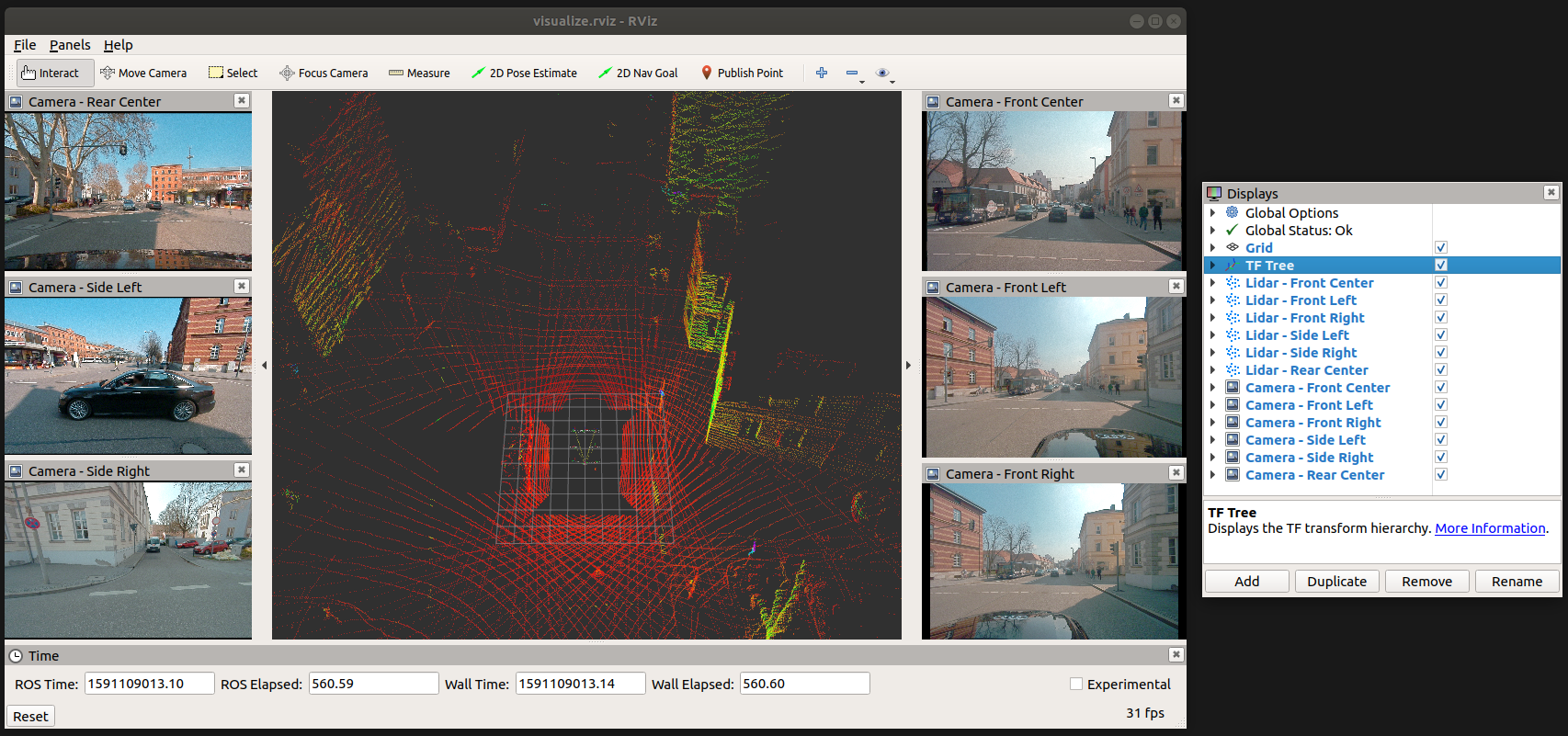Utilities for converting A2D2 data sets to ROS bags.
There is an executuable for each sensor modality: camera, lidar, and bus. Bag files are generated for these modalities independently.
For a step-by-step example of how to use the converters, see docs/WALKTHROUGH.md.
This package has the following dependencies in addition to standard ROS dependencies:
- RapidJSON: used to load, parse, and validate the JSON data files
- ROS CNPY: used to load
.npzfiles for lidar data
The ROS CNPY package can be downloaded at the above link, and RapidJSON can be installed with:
$ rosdep install a2d2_to_ros --ignore-src -r -y- Use a dedicated download utility, such as
wget, for downloading the data set files. Using a browser can be unreliable, likely due in part to the large size of the files. - Use the
--start-time,--min-time-offset, and--durationconverter options to split the converted bag files into smaller timespans (see scripts/convert.sh for an example of doing this). Therosbagutility does a poor job handling extremely large log files, so splitting them up can make them easier to use.
docs/FAQ.md contains common questions about the A2D2 data set.
Note: The Bus Signal converter also creates a bag file that publishes the TF tree for the vehicle.
For convenience, a shell script is provided in scripts/convert.sh that can batich convert an entire sensor fusion data set for a single city. Before running the script, be sure to open it and set the configuration options appropriately.
#
# START: CONFIGURATION OPTIONS
#
# The below two paths should point to the data set root and ROS package
package_source=~/catkin_ws/src/a2d2_to_ros
data_root=~/data/a2d2
# Duration (in integer seconds) to record into a single bag file before splitting off a new one
split_duration=7
# Relative location of the sensor fusion data set being converted
# Set 'sensor_data' to the desired location
munich_data= #TODO
gaimersheim_data= #TODO
ingolstadt_data=camera_lidar/20190401_145936
sensor_data=$ingolstadt_data
# Earliest time in the data set (in microseconds) for which all sensor modalities provide data
# Set 'record_start_time' to the appropriate time for the dataset being converted
munich_start_time= #TODO
gaimersheim_start_time= #TODO
ingolstadt_start_time=1554121595035037
record_start_time=$ingolstadt_start_time
# Approximate duration (in integer seconds) of the data set
# Set 'data_set_duration' to the appropriate duration
munich_duration= #TODO
gaimersheim_duration= #TODO
ingolstadt_duration=746
data_set_duration=$ingolstadt_duration
#
# END: CONFIGURATION OPTIONS
#To run the script:
$ rosrun a2d2_to_ros convert.shNote: Be aware that the batch converter skips a bit of time at the beginning of certain sensor logs in order to enusre that split bag files are better time aligned; not all logs begin at the same time. See docs/FAQ.md.
Note: Do not run this script on the preview data set. The preview data set uses a slightly different file layout, so it will not work.
An example RViz config is included along a convenience launch file:
$ roslaunch a2d2_to_ros visualize.launchThis launches RViz pre-configured to visualize the TF tree, and the front-facing camera and lidar data.
This code is built and tested under:
- ROS Melodic with Ubuntu 18.04.4
- Clang 6.0.0 with
-std=c++14
There is nothing very platform specific, so other reasonably similar system configurations should work.
A list of open issues for the converter can be found here.
For any questions or comments about the converter, please reach out to [email protected].
